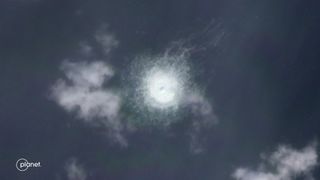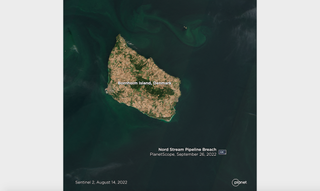
The effects of a possible act of energy sabotage are visible from space.
On Tuesday (Sept. 27), European leaders reported the discovery of three separate leaks in two Baltic Sea pipelines known as Nord Stream 1 and Nord Stream 2, which were built to carry natural gas from Russia to Germany.
The leaks sent methane gas streaming to the Baltic Sea surface, creating bubbly white patches that look somewhat like churning hurricanes. On Monday (Sept. 26), a tiny Earth-observing satellite managed to spot one of these dramatic signatures — the patch above the Nord Stream 2 breach, which lies just southeast of Denmark's Bornholm Island. (The other two leaks are in the Nord Stream 1 line.)
Related: Views of Earth by Planet's Dove cubesats (photos)

That satellite is a Dove, a cubesat built by Planet. The San Francisco company currently operates a fleet of about 200 Doves, each of which is just the size of a shoebox but can resolve features as small as 10 feet (3 meters) on Earth's surface.
The Dove probably saw evidence of sabotage, according to some European leaders. It would be very unlikely for two pipelines to spring three leaks nearly simultaneously without human intervention of some sort, researchers and government officials have said. And seismologists recorded powerful explosions near the leak sites on Monday (Sept. 26), which hardly seems like a coincidence.
It's unclear at the moment who's responsible for the explosions and what they were intended to achieve (if indeed they were intentional). Investigations are planned but cannot get fully underway until the breaches are repaired, experts have said.
Get the Space.com Newsletter
Breaking space news, the latest updates on rocket launches, skywatching events and more!
Tensions between Russia and the West have been high since Russia invaded Ukraine in February. The United States and other nations, including many in Europe, have responded to the ongoing aggression with a series of economic sanctions against Russia.
Russia is a major energy producer, and it has traditionally sold much of its natural gas to Europe. Russia had been sending natural gas to Europe via Nord Stream 1 but stopped the flow in August, according to Reuters.
"The new Nord Stream 2 pipeline had yet to enter commercial operations," Reuters added. "The plan to use it to supply gas was scrapped by Germany days before Russia began what it calls a 'special military operation' in Ukraine in late February."
Mike Wall is the author of "Out There" (Grand Central Publishing, 2018; illustrated by Karl Tate), a book about the search for alien life. Follow him on Twitter @michaeldwall. Follow us on Twitter @Spacedotcom or on Facebook.
Join our Space Forums to keep talking space on the latest missions, night sky and more! And if you have a news tip, correction or comment, let us know at: community@space.com.

Michael Wall is a Senior Space Writer with Space.com and joined the team in 2010. He primarily covers exoplanets, spaceflight and military space, but has been known to dabble in the space art beat. His book about the search for alien life, "Out There," was published on Nov. 13, 2018. Before becoming a science writer, Michael worked as a herpetologist and wildlife biologist. He has a Ph.D. in evolutionary biology from the University of Sydney, Australia, a bachelor's degree from the University of Arizona, and a graduate certificate in science writing from the University of California, Santa Cruz. To find out what his latest project is, you can follow Michael on Twitter.
